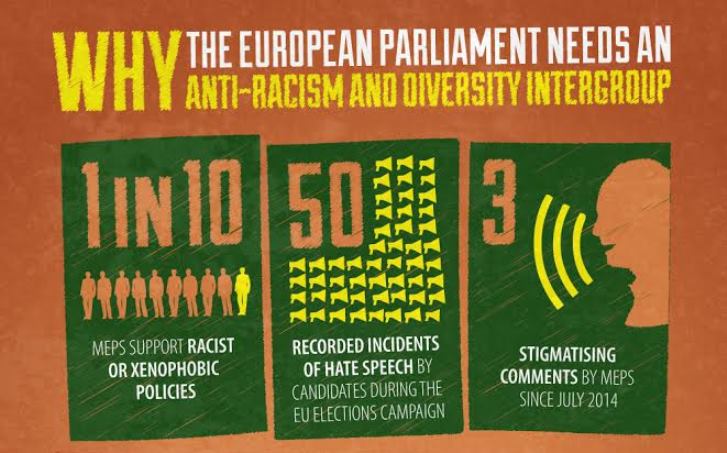
Stronger Together: The Case for a European Parliament Intergroup against Racism
Some Members of the European Parliament have proposed the creation of a parliamentary intergroup to promote equality and non-discrimination. The Open Society European Policy Institute asked Claire Fernandez, deputy director of policy for ENAR, and Bruno Selun, secretary of the successful Intergroup on LGBTI rights in the previous parliamentary term, how such an intergroup would help shape the Parliament’s views.
Why is this a crucial moment to speak up for racial equality in Europe?
CLAIRE FERNANDEZ: There have always been reasons to speak up for human rights and equality in Europe, but these have become more compelling as public attitudes and policies have become worse. In recent years, France and Italy have carried out mass evictions and segregation of Roma communities; job applicants in the Netherlands from Moroccan, Turkish, or Surinamese background have experienced higher discrimination on the labor market; and two-thirds of Jewish respondents of a FRA survey indicated anti-Semitism to be a major problem in the EU member states surveyed.
The infrastructure of laws and policies that protect the most vulnerable groups in Europe—much of which was put in place at the European level—is under attack, and the European Parliament has a crucial role to play in protecting it. Especially now the European elections have brought more members of the European Parliament (MEPs) promoting racist or xenophobic policies and practices to the European Parliament, who are willing to challenge the protection of rights, freedoms, equality, and diversity in Europe. Already, during one of the first debates of the new European Parliament in July, Polish far-right MEP Janusz Korwin-Mikke used derogatory, racist language that risks bringing the institution into disrepute.
An intergroup on equality, diversity, and nondiscrimination would not only help the EU step up its work to promote equality in the member states, but also prevent the Parliament from being used as a platform to promote intolerance.
What is the role of the European Parliament on these issues?
CF: The European Parliament shares responsibility with the Council for the development of EU law, policy, and decisions on EU funding for the vast majority of policy areas—including racial equality, migration, and asylum. These are sensitive areas prone to xenophobic populist rhetoric fueled by demands for the exclusion of ethnic and religious minorities and migrants.
Xenophobic populist pressure on mainstream parties risks compromising policies in important areas such as free movement within the EU, the regulation of legal migration from outside the EU, Roma inclusion policies, the adoption of the horizontal Directive on Equal Treatment, or the implementation of the EU Equality Directives and the European Common Asylum System. Most of the Parliament’s work is organized through committees, and the negotiations about the Parliament’s position on these policies are primarily done in the Committee on Civil Liberties (LIBE).
So if MEPs are already working on these issues in the committees, what is the added value of an intergroup on equality, diversity, and nondiscrimination?
BRUNO SELUN: Although the LIBE committee would be the one most directly working on issues of equality, diversity, and nondiscrimination, neither LIBE nor any of the other committees explicitly looks at race equality and other grounds for discrimination. In addition, dossiers dealt with in other committees, such as international trade, employment, or public health have implications for ethnic and religious minorities and migrants in the European Union too.
Likewise, discrimination often occurs at the intersection of personal characteristics, such as gender, class, race, nationality, and age. Both relevant themes and MEPs might be in different committees on different issues. An intergroup provides a single, informal platform for MEPs from all political groups, beyond partisan lines, to analyze the Parliament’s work in light of these considerations, and to mainstream a focus on equality and nondiscrimination across all policy areas.
What would an intergroup on human rights, equality, diversity, and nondiscrimination do?
BS: The intergroup would be a unique forum for MEPs to meet and coordinate with colleagues from other political groups; generate knowledge on racial equality and discrimination in Europe; meet the rapporteurs from various committees on relevant dossiers and offer input for their work; and meet civil society representatives or individuals with direct experience or recognized expertise in the topic.
CF: As a vehicle for communication, awareness raising, and coordinated action, one of the previous Anti-Racism and Diversity Intergroups proved very successful when it drafted a written declaration on fighting racism in football that generated so much support from other MEPs that it got adopted as a formal European Parliament resolution.
BS: In this way, an effective intergroup allows MEPs from all parties to contribute to influencing the work of the European Parliament and ensuring that EU law, policy, and funding goes to addressing discriminatory policies and prejudicial attitudes at the national and European levels. This is certainly what happened in the previous legislature with the LGBTI Intergroup, so let’s hope the work for diversity can be as successful these coming five years.
Published on the Open Society Foundations’ Voices on 25 November 2014.



